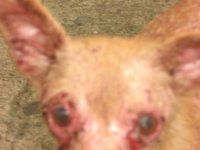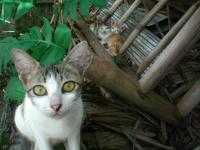Source: www.pet-grub.com
If you wish to quickly print this entire book with the greatest of ease, please read the following page:
Causes Of Symptoms
Sponsored Links
In veterinary school, we had an acronym for remembering the various causes for a patient's symptoms. Each letter of D.A.M.N.I.T. stands for at least one cause, e.g. degeneration, auto–immunity, metabolic, nutritional, etc. When seeking a diagnosis, running through this list assists the veterinarian in leaving no diagnostic stone unturned. In the past few years, I have come up with my own homeopathy friendly
version which I would like to share with you. When I receive a call about a pet with a health concern, I use A M.I.N.D. which stands for Appropriate, Malnutrition, Injury, Noxious substance, Disease. In my approach to health care, these are the five possible causes of any symptom.
Let's look at an example. The symptom of diarrhea may be an Appropriate response. Most symptoms are the body's ways of coping. They are either protective or expulsive. If an animal raids the garbage can and eats things he/she should not, diarrhea is one of the corrective mechanisms the body can use to cleanse itself and prevent absorption of toxic material into the blood stream. In an Appropriate response situation, the onset will be sudden with a rapid rise in the intensity of the symptoms. In an otherwise healthy individual, the system should return to normal within 72 hours without any treatment other than supportive therapy when indicated.
According to the American Heritage Dictionary, Malnutrition is Poor nutrition because of an insufficient or poorly balanced diet or faulty digestion or utilization of foods
. This is one of the most common causes of symptoms in pets. Dogs and cats are carnivores by nature. The wild carnivore diet is high in animal protein, low in fiber and very low in complex carbohydrates. Most pet foods contain about half of the protein level found in a natural diet and 30% or higher carbohydrates. Fiber levels vary from low to extremely high. It doesn't require genius to see how in some animals, this can result in digestive problems or any of a myriad of other symptoms. If the diet is the problem, the symptom will usually come on gradually (unless the food was recently changed, in which case, it would be sudden) and become chronic. The only way to correct diet related problems is to change to a diet appropriate for the species.
Injury refers to something that physically damages tissue. Cuts, fractures, etc. are common injuries. In the case of diarrhea, bowel damage may come from a foreign body or indigestible material. Injuries have a sudden onset. In order for the body to heal, the damaged tissue may require physical support (splint, stitches, etc.). In the case of the digestive tract, the injurious material needs to be removed or expelled. In most cases, if the gut is not punctured, nothing more than supportive therapy is necessary. If the material cannot be expelled, some method of removing it (endoscopy, surgery) will be needed.
Continuing with A.M.I.N.D., we move to Noxious substances. To me, a Noxious substance is one that damages cells or their functions via poisoning or genetic damage not trauma. These substances may be naturally occurring or human–made. It is well known that non–steroidal anti–inflammatory drugs such as aspirin and ibuprofen cause damage to intestinal cells. These drugs reduce inflammation by preventing synthesis of compounds called prostaglandins. Reducing the production of prostaglandins also reduces the mucus which lines the intestines and protects them. Restoring proper function requires the removal of the Noxious substance. Generally, a reasonably healthy individual will return to normal within a few days. The last letter of my acronym is D
for Disease. As I have discussed in recent articles, Disease is a disturbance in cell function that is not a result of any of the above, although it may have begun that way. Continuing with the example, inflammatory bowel disease
is a common chronic disease of animals. If the individual is placed on a good diet with no evidence of injury or noxious stimuli and the diarrhea continues, the symptom is a result of a disease process. As I have made clear in past writings, I believe that Disease requires homeopathic treatment if one wishes to cure it.
As I hope you have noticed reading this article, not every symptom requires treatment. Part of the Art of Healing
is to know when to do nothing and allow the body to heal itself and when to act. The other part of healing is to understand whether the treatment is exacerbating the condition or improving health.
- Russell Swift, DVM, Classical Homeopath
Feel Free To Read Another Article
Feel free to read another article or continue exploring the rest of my web site. Remember, you can also visit my question and answers also.
 Meet Jumbo, the participant in
Meet Jumbo, the participant in 